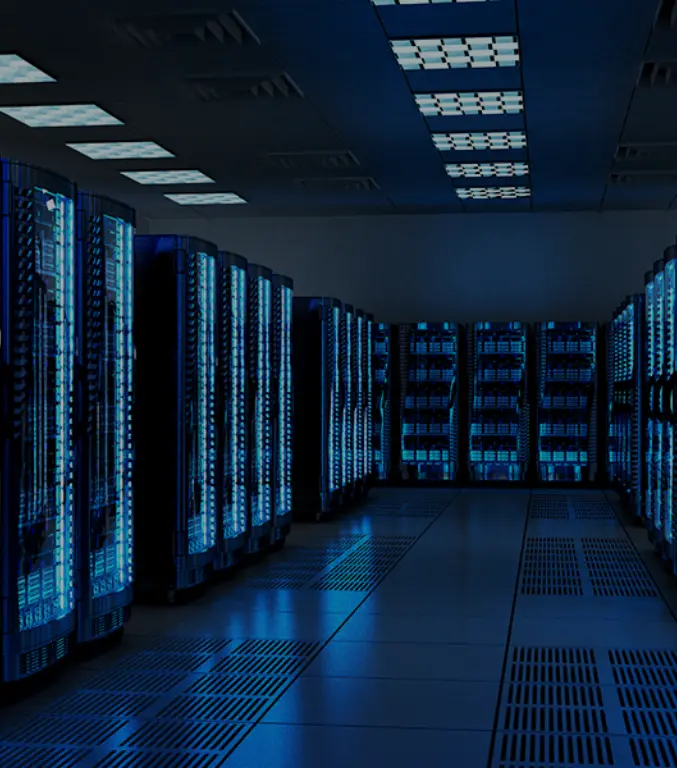Uvation Helps Manufacturers Scale Their Data Center Operations
Uvation Provides Manufacturers with Scalable Data Solutions that Perform at Industry 4.0 Standards
Leveraging a data center allows you to cluster active servers and maintain uninterrupted access to critical applications and computing resources. Even in the event of an outage or systems failure, maintain optimal uptime through the implementation of automatic failover processes.
With the right data center environment, you can take advantage of industry-leading load-balancing systems. Minimize single points of failure and ensure the availability of your computing assets for all users, including your staff and your valued customers.
Data center environments allow you to scale your business through the installation of additional nodes and servers, expanding your computing power to meet your growth demands. You can dedicate servers to specific tasks, such as workflow automation or API traffic, and you can deploy resources to prepare for overflow and maintain performance during periods of high demand.
Through clear planning, you can create a cost-effective data center that delivers a substantial ROI and prepares you for future growth.
Data center services provide you with more opportunities to protect your organization from risks. Create your own disaster recovery sites, so you can maintain operations even during a catastrophic outage. Locate your disaster recovery site remotely to protect your assets, even when your production location is put at physical risk.
With a strategically placed recovery site and a comprehensive disaster recovery plan, you can bring your entire system back online in no time.
Choose from several unique options when deploying your data center to ensure security, continuity, and scalability. Rent space in a data center and securely place your hardware, so you can maintain your servers more affordably and reduce risk in the process.
Even if you don’t own your hardware, you can rent servers and nodes from colocation service providers to scale your operations quickly.
Uvation’s data center experts are prepared to help you develop your data center strategy and choose an optimal deployment model, both for growth and your immediate business needs. We can help you find an ideal solution by conducting an audit of your current deployment, then working with top providers to find a data center solution that drives your business forward.
Contact Uvation today to start developing your data center strategy and a roadmap for the future.

A data center is a facility that houses critical computing infrastructure, including hardware and software, on behalf of an organization or organizations. In the past, most data centers were physical buildings that housed server banks and other technologies to both manage the physical environment of the facility—namely, temperature fluctuations—and the flow of data in and out of the facility through connections.
In this case, hardware refers to physical computers, routers, and switches. A sever is a good example of a type of computing hardware, as is a desktop or laptop computer. Meanwhile, software refers to the applications used by businesses and powered by computing hardware. This could include web servers, applications, content management systems, and operating systems.
The purpose of a data center is to house the network of computing and file storage resources that enable organizations to work with data and run applications. In many ways, “the cloud” as most people understand it refers to operations and files that are stored and processed remotely in data centers rather than on terminals like laptops and desktops.
Data centers are composed of several physical and technical elements. These include switches, routers, and cooling systems, as well as virtual elements like firewalls and security software. To power a data center, there is typically a significant power and safety infrastructure in place which includes uninterruptible power supplies (UPS) and backup generators to maintain uptime. A data center will also include fire suppression systems and physical security solutions to maintain security. Overall, a data center includes three components: compute, storage, and networking.
• Compute refers to the memory and processing power used to run applications. These are provided by the servers.
• Storage refers to the storage drives used to house enterprise data. This could be traditional tape drives or solid-state drives, and they typically include multiple backups for security.
• Finally,networking refers to the connections between the hardware within the data center and the outside world. Safe connectivity is accomplished through routers, switches, and delivery systems.
Today, organizations can gain the benefits of data centers through colocation. In this model, the facility and much of its base infrastructures, such as power, ventilation, and security, are included as part of a contract. The company rents space in the facility and moves its servers into the space.
Colocation allows companies to maintain control of their servers and computing environments without encountering the restrictive costs of maintaining an entire facility.
Edge computing is an emerging trend that places data center capabilities at the edge of the network, closer to where data is first gathered. This is often accomplished with micro data centers—smaller units that can process and analyze data quickly and deliver real-time insights. By placing these capabilities at the edge of the network, less bandwidth is needed to run critical applications and actions can be completed more efficiently.
Uvation provides companies with multiple options for achieving their data center goals.
If you’re just beginning your data center journey, we can help you build a strategy that will prepare you for years of growth. Whether you need to start from scratch or need a team to augment your existing staff, our data center experts can guide you.
Data center deployments require that you select and maintain any number of technologies and applications—including servers, firewalls, and more—all of which must be maintained and updated regularly. Uvation lends you the technical expertise you need to make optimal selections for your business. Our goal is to help you establish a data center deployment that helps you grow and keeps your company secure.
Here are the data center deployments of which you should be aware.
In-house data center deployments tend to be the most complicated and expensive, but they also give you the most control. In this model, your organization will either build its own data center facility or rent space in an existing building and establish a data center.
Because you aren’t working with a provider, you will be responsible for every aspect of the deployment, including power, maintenance, and the physical security of the building. This is often a viable solution for companies that have a lot of existing capital and a large footprint.
In a colocation model, you place your owned servers into a space you’ve rented in a data center facility. This allows you to maintain control over your servers, their operating systems, and many aspects of your security environment while outsourcing the costly aspects of operating an entire building.
This is ideal for mid-sized businesses and companies that need to meet rigorous security demands regarding their data. It provides many of the benefits of an in-house data center but it is much more affordable.
Through the right hosting environment, you can create a cloud deployment that rivals the computing power of some data centers. This is made possible through significant arrangements with top cloud providers like Amazon Web Services, Microsoft Azure, and others.
In this model, you outsource every aspect of your data center to the cloud provider and access your computing resources remotely. This is an excellent option for smaller companies, startups, and companies that require real-time, cost-effective flexibility in their computing environments.
Uvation provides companies with multiple options for achieving their data center goals.
If you’re just beginning your data center journey, we can help you build a strategy that will prepare you for years of growth. Whether you need to start from scratch or need a team to augment your existing staff, our data center experts can guide you.
Markets
Datacenters
Carrier Access Points
Sq. Ft. of Resources
Network Backbone
Uvation Provides Manufacturers with Scalable Data Solutions that Perform at Industry 4.0 Standards
Data centers provide companies with the computing power they need to run apps, analyze information, and store large digital files. The traditional data center model has worked for years, but many companies now require faster, dedicated resources at specific locations to support their businesses.
The hybrid work model—characterized by a combination of both onsite and remote workers—is becoming increasingly common around the world, as employers come to terms with the realities of a permanent remote workforce. Forrester anticipates only 30% of companies will return to a traditional in-office model after the COVID-19 subsides.
